Quaker Parrot, also known as Monk Parakeets, are vibrant, intelligent, and social members of the Psittacidae family. Their unique personalities make them stand out among other parrot species, and they’re cherished as friendly and engaging companions. These birds are well-known for their incredible intelligence, remarkable ability to mimic human speech, and knack for forming strong emotional bonds with their owners.
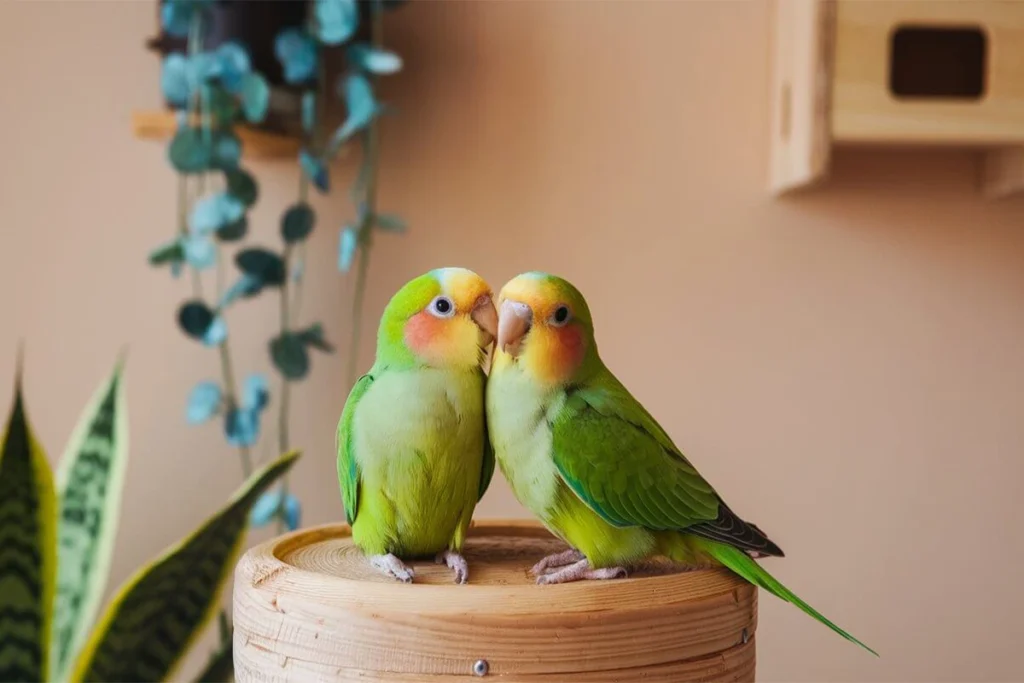
Understanding a Quaker Parrot’s personality is essential for anyone considering bringing one into their home. These birds thrive in social environments, and their outgoing nature demands attention, interaction, and mental stimulation. Neglecting their need for social and intellectual engagement can lead to boredom or undesirable behaviors. However, with proper care and enrichment, Quaker Parrots can be playful, loving, and highly entertaining pets.
This blog will delve into the fascinating world of Quaker Parrot personality traits. You’ll discover why they’re so social and intelligent, how their behavior reflects their natural instincts, and what it takes to care for them effectively. By the end of this post, you’ll have a deeper appreciation for these remarkable birds and the tools to provide them with a fulfilling life.
Understanding the Quaker Parrot’s Personality
Overview of Quaker Parrot Traits and Behavior
Quaker Parrots exhibit a range of distinctive traits that set them apart from other pet birds. They are highly social, intelligent, and adaptable, making them excellent companions for those willing to meet their needs. These birds are known for their confidence and curiosity, often exploring their environment with enthusiasm and investigating anything that catches their attention. Their playful nature is complemented by their strong desire for interaction, both with humans and other birds.
One of the most striking aspects of a Quaker Parrot’s behavior is their vocal ability. They are skilled at mimicking sounds and can develop an extensive vocabulary with regular interaction. Their vocalizations aren’t just limited to mimicry—they also use a variety of chirps, whistles, and squawks to communicate their feelings and needs. Additionally, Quaker Parrots display problem-solving skills and enjoy activities that challenge their intelligence, such as puzzles and foraging games.
Why They Are Considered Social and Friendly Pet Birds
Quaker Parrots have earned a reputation as one of the most social and friendly pet bird species. They thrive on interaction and form deep bonds with their owners, often seeking attention and companionship throughout the day. Unlike some birds that prefer limited contact, Quaker Parrots actively engage with their human family members, following them around, mimicking their speech, and participating in daily activities.
Their flock mentality contributes to their sociable nature. In the wild, Quaker Parrots live in large, cooperative communities, which translates into a strong need for social interaction in captivity. Owners who spend quality time with their Quaker Parrot often find them affectionate and loyal, frequently displaying behaviors like cuddling, preening, or perching on their favorite person’s shoulder. This strong social bond makes them ideal pets for individuals or families who can dedicate time and attention to them.
Examples of Quaker Parrot Playful and Curious Nature
Quaker Parrots are naturally playful and curious creatures. They love to explore their surroundings and engage with toys, often inventing games or using their beaks to manipulate objects in creative ways. Their energetic personalities shine when they are given opportunities to climb, swing, and interact with various enrichment tools. Whether it’s chewing on wooden toys, ringing bells, or unraveling knots, they approach playtime with enthusiasm and ingenuity.
Their curiosity often leads to amusing antics. A Quaker Parrot might investigate household items, mimic the sounds of appliances, or attempt to “help” their owner with tasks by picking up objects. This inquisitive behavior not only showcases their intelligence but also reinforces the importance of providing a stimulating environment. Owners who encourage and nurture this playful nature often find their Quaker Parrots to be a source of endless entertainment and joy.
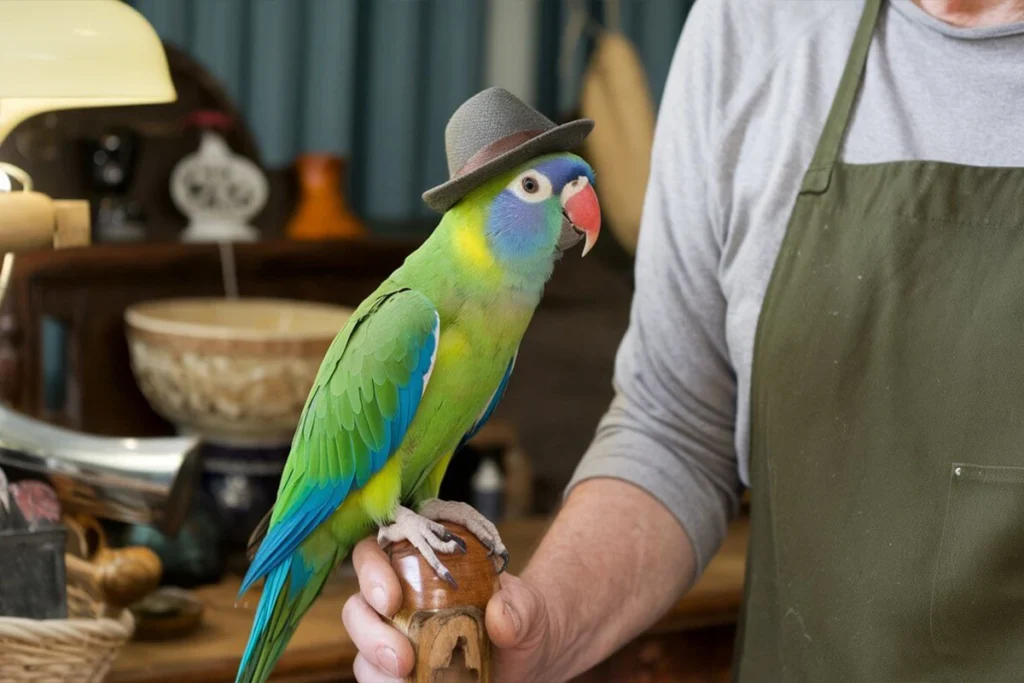
Social Behavior of Quaker Parrots
How Quaker Parrots Interact with Humans and Other Birds
Quaker Parrots are highly interactive and form strong connections with humans and other birds. They often seek attention and love to be involved in the daily lives of their owners. These parrots are known for their ability to mimic human speech and gestures, which makes their interactions lively and engaging. A Quaker Parrot might greet you with a cheerful chirp, mimic your laughter, or even try to join in conversations by repeating words or phrases.
Their interactions with other birds are equally fascinating. Quaker Parrots are naturally social creatures, so they tend to form bonds with other parrots or birds in their environment. In multi-bird households, they may communicate through vocalizations, mimicry, or playful behavior. However, it’s essential to monitor their interactions to ensure compatibility and prevent dominance issues.
Building an Emotional Bond with Your Quaker Parrot
Creating a strong emotional bond with a Quaker Parrot requires time, patience, and consistent effort. These birds thrive on interaction and quickly recognize and respond to their caregivers. Spending quality time with your parrot through play, training, and simple companionship helps build trust and deepen your relationship.
Quaker Parrots are highly perceptive and can pick up on your emotions, making it easier to establish a meaningful connection. Positive reinforcement is a powerful tool for building this bond. Rewarding your parrot with treats, praise, or affection when they display desirable behaviors strengthens their trust in you. Engaging in shared activities, such as teaching tricks or solving puzzles together, also fosters a deeper emotional connection.
The Importance of Quaker parrot Flock Mentality in Domestic Settings
A Quaker Parrot’s flock mentality plays a significant role in shaping their behavior and needs in domestic settings. In the wild, these birds live in large, cooperative groups that work together to find food, build nests, and protect one another. This instinctual need for social interaction carries over to their life as pets.
In a home environment, Quaker Parrots view their human family as part of their “flock.” They often crave attention and feel most secure when they are included in family activities. Ignoring their need for socialization can lead to stress or behavioral problems such as excessive screaming or feather plucking. Providing regular interaction, a stimulating environment, and opportunities to bond ensures they remain happy and well-adjusted.
Intelligence and Training: Unlocking Their Potential
How Quaker Parrots Demonstrate Advanced Avian Intelligence
Quaker Parrots rank among the most intelligent parrot species, showcasing advanced problem-solving skills, adaptability, and memory. These birds excel in recognizing patterns, mimicking human speech, and learning complex behaviors. Their cognitive abilities often rival those of young children, making them fascinating companions for anyone who appreciates highly interactive pets.
One of the most notable demonstrations of their intelligence is their ability to mimic sounds and words. Quaker Parrots don’t just repeat phrases; they can use words in context to communicate needs or emotions, such as saying “hello” when you enter the room or calling out for attention. They also excel at understanding cause-and-effect relationships, such as ringing a bell to signal their desire for treats or playtime.
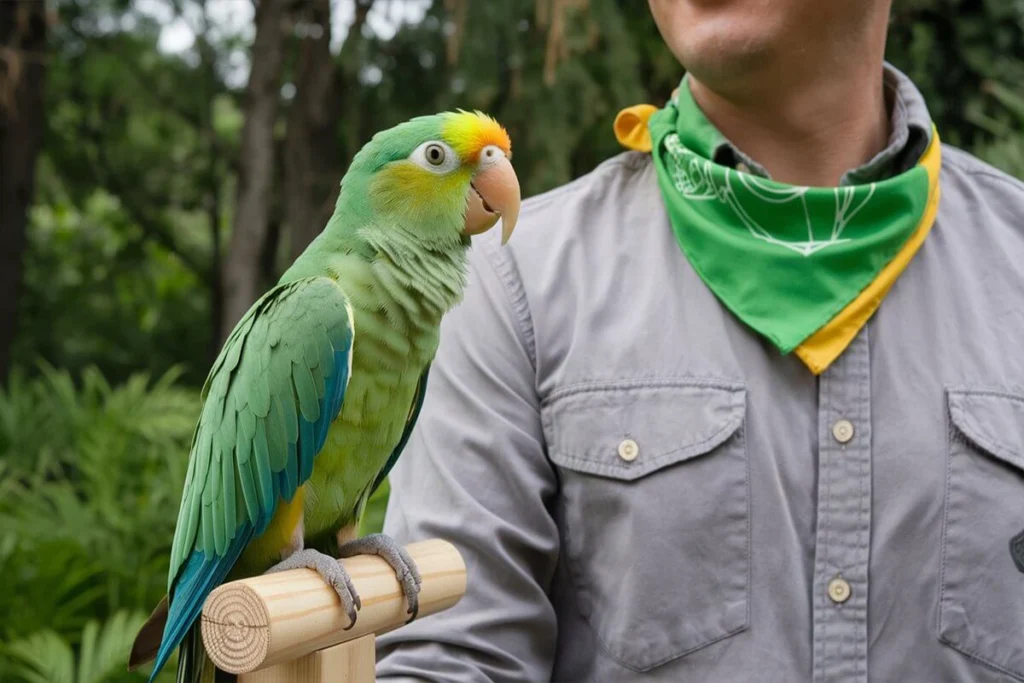
Their curiosity and resourcefulness further highlight their intelligence. Quaker Parrots are known to explore their environment actively, testing new objects and figuring out how things work. Whether it’s opening cage doors, unlocking puzzles, or finding creative ways to forage for food, these behaviors reflect their sharp mental acuity.
Tips for Effective Quaker Parrot Training
Training a Quaker Parrot is a rewarding experience that strengthens your bond while encouraging their mental growth. To train your parrot effectively, it’s essential to use methods that align with their intelligence and social nature.
- Positive Reinforcement: Reward your parrot with treats, praise, or affection whenever they successfully perform a desired behavior. This approach motivates them to learn and builds trust between you and your pet.
- Consistency is Key: Quaker Parrots thrive on routine. Conduct training sessions at the same time every day to create a structured learning environment.
- Start with Simple Commands: Begin with basic tricks like “step up” or “wave” to establish a foundation for more complex behaviors. Gradually increase the difficulty as your parrot becomes more confident.
- Use Visual and Verbal Cues: Combine hand gestures with verbal commands to reinforce learning. For example, raise your hand while saying “wave” to help them associate the action with the word.
- Keep Sessions Short and Fun: Limit training sessions to 10-15 minutes to prevent boredom or frustration. End each session on a positive note by rewarding them for their effort.
Enhancing Their Talking Abilities and Problem-Solving Skills
Quaker Parrots are exceptional talkers, often rivaling larger parrot species in their ability to mimic human speech. To enhance their talking abilities, it’s crucial to provide consistent practice and a stimulating environment.
- Repetition and Patience: Repeating words or phrases in a clear and cheerful tone encourages your parrot to mimic you. Use phrases they hear frequently, like “good morning” or “I love you,” to make the learning process natural.
- Interactive Conversations: Engage in two-way interactions by responding to their vocalizations. This back-and-forth exchange motivates them to use their voice more often.
- Exposure to Variety: Play recordings of new words or phrases to expand their vocabulary. However, avoid overwhelming them by introducing too many words at once.
To sharpen their problem-solving skills, provide activities that challenge their intelligence:
- Foraging Toys: Hide treats inside puzzles or layered toys to encourage them to work for their reward.
- DIY Challenges: Create simple puzzles using household items like cardboard tubes or small containers.
- Rotate Toys Regularly: Switching out their toys prevents boredom and keeps their environment dynamic and mentally stimulating.
By nurturing their natural abilities, you can unlock the full potential of your Quaker Parrot, ensuring they remain happy, healthy, and intellectually fulfilled.
Enrichment for Quaker Parrots: Toys and Activities
Why Mental Stimulation is Crucial for Quaker Parrots
Quaker Parrots are intelligent and highly active birds that require consistent mental stimulation to maintain their well-being. Without proper engagement, these curious creatures can become bored, stressed, or even depressed, leading to undesirable behaviors such as excessive screaming, feather plucking, or aggression. Mental stimulation not only keeps their minds sharp but also allows them to channel their energy in positive and productive ways.
In the wild, Quaker Parrots spend their days foraging for food, building nests, and interacting with their flock. These activities challenge their problem-solving skills and keep them mentally occupied. In a domestic setting, replicating these natural behaviors is essential to their happiness. Providing opportunities for exploration, play, and learning helps satisfy their intellectual needs and enhances their overall quality of life.
Types of Toys and Activities That Keep Them Engaged and Happy
- Foraging Toys: These toys mimic the natural behavior of searching for food. Hide treats inside puzzles, shredded paper, or layered compartments to encourage them to use their problem-solving skills.
- Interactive Toys: Toys that respond to their actions, such as bells, swings, or buttons, keep them entertained while stimulating their senses.
- Chewable Items: Wooden blocks, ropes, and other durable materials allow them to exercise their beaks while satisfying their instinct to chew.
- Training and Games: Incorporate games like fetch or teach them tricks during playtime. These activities engage both their body and mind, strengthening your bond in the process.
- DIY Activities: Create simple challenges using household items like cardboard tubes, paper bags, or non-toxic bottle caps. Rotate these DIY creations regularly to keep their environment fresh and exciting.
The Role of Bird Toys in Preventing Boredom and Undesirable Behavior
Bird toys play a vital role in preventing behavioral problems in Quaker Parrots. Boredom can quickly lead to frustration, which may manifest in destructive habits like excessive chewing, territorial aggression, or self-harm. Toys provide an outlet for their energy and prevent these issues by offering a safe and constructive way to stay busy.
In addition to physical engagement, toys contribute to their emotional well-being. A well-stimulated Quaker Parrot is more likely to exhibit positive behaviors such as playful interaction, mimicry, and affection toward their owners. By rotating toys and incorporating a variety of options, you ensure that their curiosity and enthusiasm remain high, promoting a healthy and happy lifestyle.
Supporting Points
- Environmental Enrichment: Regularly changing their surroundings, such as rearranging their cage or introducing new perches, complements the benefits of toys.
- Social Interaction: Mental stimulation isn’t just about toys; spending time talking, training, or playing with your parrot strengthens their bond with you and enriches their life.
- Time Outside the Cage: Allowing supervised free-flight or exploration in a bird-safe room provides mental and physical stimulation beyond the confines of their enclosure.
- Balanced Variety: Combining toys, training, and interaction ensures your Quaker Parrot receives a holistic approach to engagement, preventing monotony and fostering a vibrant personality.
Tips for Caring for Social and Smart Quaker Parrots
Essential Care Tips to Meet Their Physical and Emotional Needs
Meeting the physical and emotional needs of a Quaker Parrot is crucial for ensuring their health, happiness, and longevity. These birds thrive when their environment, diet, and interactions align with their natural instincts and personality traits. Proper care involves providing a balanced diet, regular exercise, and ample socialization opportunities. Equally important is understanding their emotional needs, such as feeling secure, loved, and mentally stimulated.
A well-cared-for Quaker Parrot will display positive behaviors, such as vocalization, playful curiosity, and affectionate interaction. Neglecting their needs, however, can lead to health issues, stress, or behavioral problems. By prioritizing both their physical and emotional well-being, you can foster a fulfilling and harmonious relationship with your feathered companion.
How to Create a Suitable Living Environment for a Social Bird
- Spacious Cage: Quaker Parrots need a cage that allows them to move freely, spread their wings, and climb. Opt for a cage that’s at least 18x18x24 inches, with horizontal bars for climbing and plenty of room for toys and perches.
- Perches and Climbing Structures: Include a variety of perches made from natural wood, rope, or other non-toxic materials to encourage exercise and maintain healthy feet.
- Safe Play Area: Provide a designated bird-safe zone outside the cage where they can explore and play under supervision. Ensure the area is free from hazards like sharp objects, toxic plants, or open water.
- Environmental Enrichment: Add toys, swings, and puzzle feeders to their cage. Rotating these items weekly keeps their environment stimulating and prevents boredom.
- Proper Lighting: Ensure the cage is placed in a well-lit area but out of direct sunlight or drafts. Natural light or full-spectrum lighting helps regulate their circadian rhythms.
The Importance of a Consistent Routine in Their Care
Quaker Parrots thrive on consistency. A predictable routine helps them feel secure and reduces stress, as they come to anticipate feeding times, play sessions, and rest periods. Establishing a routine also makes it easier to manage their training and care effectively.
- Feeding Schedule: Offer meals at the same times each day, incorporating a variety of fresh fruits, vegetables, pellets, and seeds. Consistent feeding ensures they receive proper nutrition and builds trust in their environment.
- Daily Interaction: Dedicate time each day to interact with your Quaker Parrot through play, training, or simple companionship. Regular engagement strengthens your bond and prevents feelings of loneliness.
- Cleaning and Maintenance: Keep their cage clean by removing waste and replacing food and water daily. Perform deep cleaning of the cage, perches, and toys weekly to maintain a hygienic living space.
- Sleep Routine: Ensure they get 10-12 hours of uninterrupted sleep each night by covering their cage or placing it in a quiet, dark room. Adequate rest is essential for their health and mood.
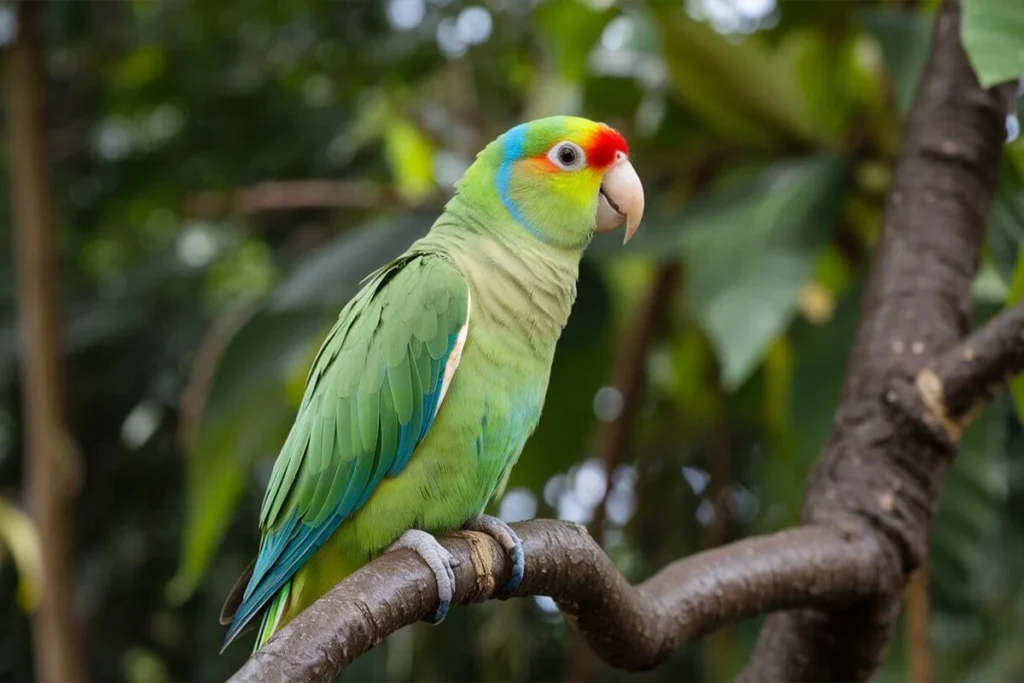
By creating a safe, stimulating environment and maintaining a consistent care routine, you can meet both the physical and emotional needs of your Quaker Parrot, allowing them to flourish as a cherished member of your household.
Conclusion
Quaker Parrots are extraordinary companions, blending intelligence, sociability, and charm in a way that captivates bird enthusiasts worldwide. Their vibrant personalities and emotional depth make them more than just pets—they become cherished members of the family. However, these remarkable traits come with responsibilities that require dedication, patience, and understanding from their owners.
Caring for a Quaker Parrot means going beyond basic needs and embracing their natural instincts, such as their love for social interaction, mental stimulation, and physical activity. By providing a nurturing environment, engaging them in meaningful activities, and maintaining a consistent care routine, you can ensure your Quaker Parrot thrives both physically and emotionally.
The journey of owning a Quaker Parrot is incredibly rewarding. From their playful antics to their ability to communicate and bond deeply with their owners, these birds bring joy, laughter, and companionship into any home. By taking the time to understand and meet their unique needs, you not only enrich their lives but also create a lasting and fulfilling connection that benefits both you and your feathered friend.
Quaker Parrots remind us of the beauty of communication, trust, and mutual care. They teach us the importance of patience, empathy, and building strong relationships, making every moment spent with them a truly enriching experience. If you’re ready to embrace their lively nature and meet the challenges of their care, you’ll find that life with a Quaker Parrot is nothing short of extraordinary.
Discover More on Our Softy Pet Home Page
You can find more about Parrots on PetMD Official
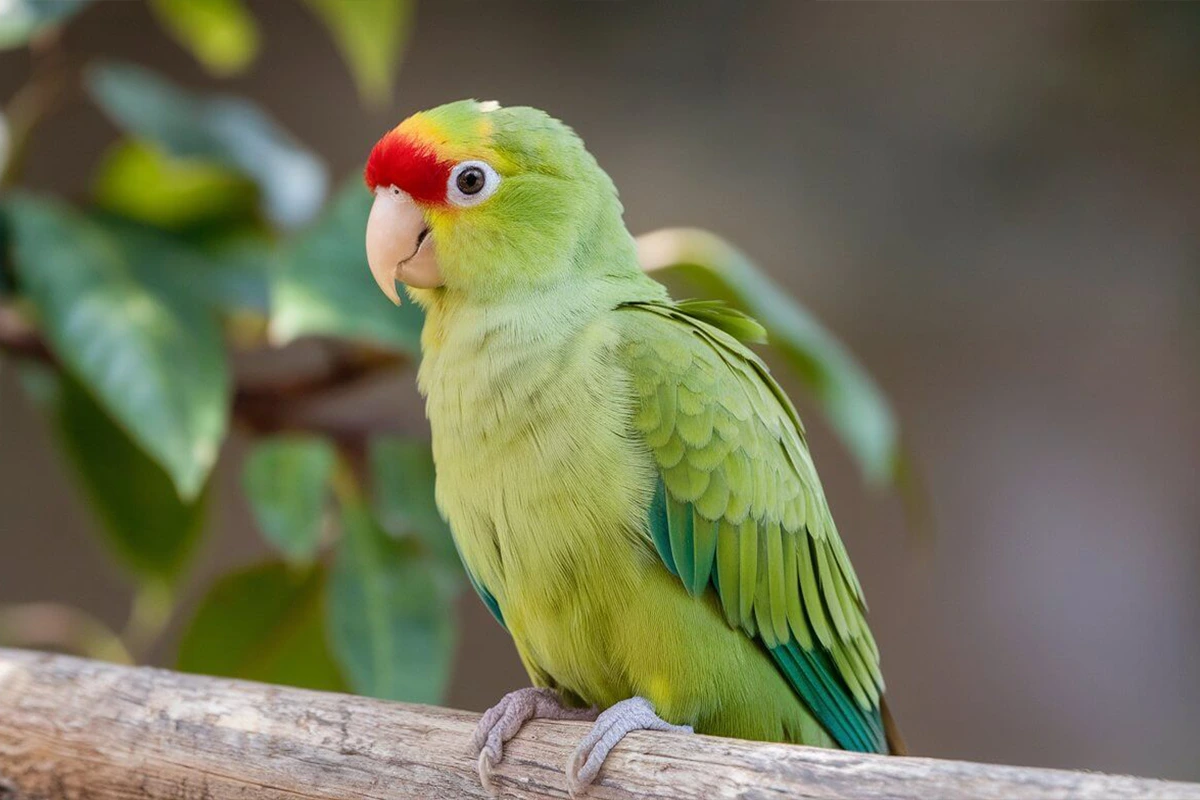
2 thoughts on “Quaker Parrot Personality: Why They’re So Social and Smart”
Comments are closed.